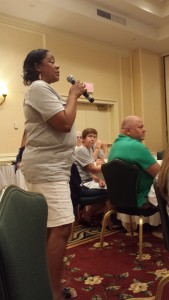Summer Conference highlights the impact of one-to-one conversations
By Scott McLennan Organize to inspire.
Inspired to organize. Either could have been the slogan forthe MTA’s 2015 Summer Conference. Held the first week in August, this year’s Summer Conference was somewhat scaled down in comparison to the events of previous years. But the work that was done during the time members spent together is certain to have a deep and lasting impact.
Those who attended conference programs in Springfield and Natick found themselves being challenged to rethink their ideas about organizing.
They also put theory into practice with visits to MTA members’ homes and schools to discuss important union and education issues. “It’s been a converting experience. Talking to people one on one, that’s powerful stuff,” said Heidi Lahey, president of the Wachusett Regional Education Association.
Lahey took part in the MTA Organizing Institute, a new Summer Conference leadership track designed to help locals learn strategies to engage more members in ongoing union activities.
Organizing Institute training culminated in an afternoon of visits to the homes of members of the Holyoke Teachers Association for discussions about the state’s decision to put their school district into receivership — and about the implications of that decision for the wider community.
Lahey said she felt skeptical at first about the effectiveness of face-to-face meetings with teachers she did not know. But after listening to a few HTA members, Lahey had a new appreciation for the remarkable work that teachers routinely do in a district whose students struggle with poverty and other obstacles.
Such field work was a new experience for many others, as well. When Wendy MacMillan of the Brookline Educators Union and Pat Partridge of the Belmont Educators Association traveled with a couple of MTA staff members to several HTA members’ homes, the Holyoke educators spoke openly about their concerns about receivership.
One pointed out that student growth in Holyoke is actually better than it is in some surrounding communities, yet that did not slow the state’s rush to take over the district. Another detailed the devastating effects of poverty he saw in his classroom. Still another drew attention to failing discipline policies.
Both Partridge and MacMillan said afterward that the conversations got them thinking about broader education issues, particularly those they do not routinely encounter.
Holly Silva of the Barnstable Educators Association echoed that sentiment during the Organizing Institute’s post-visit debriefing. “It was great to go out, meet people and talk about education,” she said. “That’s something that when we have kids in front of us, we’re too busy to do.”
The Organizing Institute’s goal — training union members to become better at identifying what fellow educators see as problems and then collectively coming up with solutions — was also reflected in other Summer Conference programs. Like the institute, longstanding tracks for new members and new presidents took place in Springfield, while the MTA Next Generation Leadership Program was held in Natick.
“Leadership is about being with people and listening and marching together,” MTA President Barbara Madeloni told the Summer Conference attendees during a reception on Aug. 3. “We need to get away from the idea of ‘leader’ as a single person.”
In his keynote address, Jackson Potter of the Chicago Teachers Union recounted how educators in his city used their 2012 strike to draw the community’s attention to the dire consequences that privatization has for public education.
Potter made connections between the punitive use of standardized tests, the closing of neighborhood schools and the proliferation of privately run charter schools in the city.
He also talked about how businesses are using loopholes to avoid taxes, thus robbing public schools of vital funding. The striking teachers successfully made the public aware of threats to public education.
“You need to learn to take fear and turn it into anger, and turn that into action,” Potter said.
Make that collective action.
Like the participants in the Organizing Institute, the members in the Next Generation Leadership Program — which ran simultaneously — spent time engaged in one-to-one conversations.
Organizer Ellen David Friedman, who worked with MTA staff at the Next Gen training in Natick, had participants in that program interview Framingham Teachers Association members at a school site about their union activities, communication strategies and capacity.
Friedman worked with MTA members from several different locals on moving from a mobilizing model to an organizing model.
“Organizing is about building the union,” she said. “It’s about making trusting relationships.”
Through deep organizing, she said, locals and the MTA as a whole will grow their power authentically. That power then drives the myriad activities — including nuts-and-bolts union work such as contract bargaining — that were explored by both new members and presidents.
The success of this year’s Summer Conference was noteworthy, given that planning was detoured twice. First, the conference was moved to UMass Amherst after Williams College informed the MTA that it could no longer host the event. Then in May, delegates at the Annual Meeting voted to cancel the conference at UMass because of a contract dispute between the university and several of its unions. Then Springfield was chosen as the main venue, and the 2015 MTA Summer Conference successfully brought together several hundred members from locals across the state for training programs, union building and socializing.
